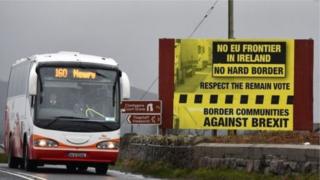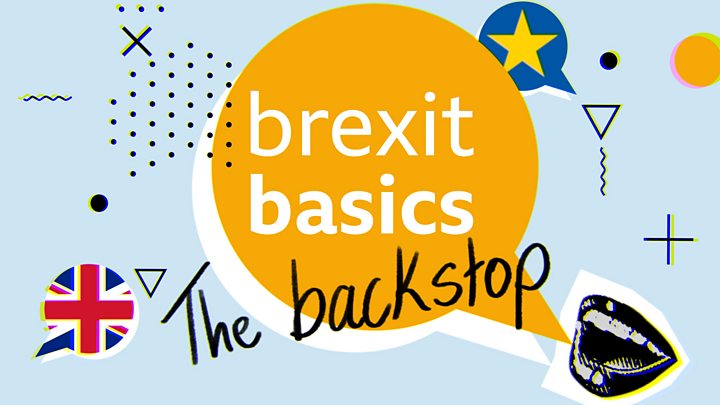 Image copyright
Image copyright
Getty Images
Both the UK and the EU have said they do not want to see a hard Irish border
It is “obvious” there will be a hard border in Ireland in the event of a no-deal Brexit, the European Commission’s chief spokesman has said.
Margaritis Schinas made the comments at the commission’s daily media briefing.
If he was pushed to speculate what might happen in a no-deal scenario, he said it was “pretty obvious you will have a hard border”.
However, the Irish government has repeated its stance that it will “not accept a hard border on this island”.
- Q&A: The Irish border Brexit backstop
- What would no-deal mean for NI economy?
- No-deal Brexit could ‘break up the UK’
In a statement, the office of Taoiseach (Irish Prime Minister) Leo Varadkar said: “Regardless of Brexit, the British government will always have responsibilities as co-guarantor of the Good Friday Agreement to ensure that, even in a no deal, there will not be a return to a border.”
‘No flexibility’
The statement added that avoiding a hard border would be “more difficult to achieve without the withdrawal agreement and would require very difficult discussions with our EU partners”.
“Working out suitable customs and trade arrangements compatible with our EU membership will require detailed discussion with the commission, while the UK will also need to live up to its responsibilities.
“We are under no illusions about how challenging that would be,” Mr Varadkar’s office added, but it also reiterated its position that the Irish government is “not planning” for a hard border.
Last week, the UK prime minister said the EU had made it “clear there will be no flexibility on border checks in no deal”.
“The Irish government will be expected to apply EU checks in full,” added Theresa May.
What did the European Commission’s spokesman say?
Mr Schinas told reporters at Tuesday’s briefing: “If you’d like to push me and speculate on what might happen in a no-deal scenario in Ireland, I think it’s pretty obvious – you will have a hard border.
“And our commitment to the Good Friday Agreement and everything that we have been doing for years with our tools, instruments and programmes will have to take, inevitably, into account this fact.
“So, of course we are for peace; of course we stand behind the Good Friday Agreement but that’s what a withdrawal… that’s a no-deal scenario, that’s what it [would] entail.
“So I will not now speculate on this plan B because, as I said seconds ago, we are for plan A, which is set by the withdrawal agreement and the political declaration as a package.”
What was the reaction to those remarks?
Northern Ireland’s Democratic Unionist Party (DUP) has described Mr Schinas’s comments as “a lot of bluff”.
The party’s Brexit spokesman, Sammy Wilson, said he believed the EU was trying to “up the ante” as the Brexit deadlock continues.
He said his party would not be scared into voting for the deal that includes the current Irish “backstop” – the controversial insurance policy designed to prevent a hard border if the UK leaves the EU without securing an all-encompassing deal.

The DUP MP acknowledged there would be pressure on the Irish government now, but he urged the British government not to listen to what the EU has said about a hard border.
“Good luck to them (the EU) if they think they can put a hard border up,” Mr Wilson added.
“We’ll see it for bluff come 1 April, if there is no deal.”
Can a no-deal Brexit still be avoided?
Unless the EU and UK strike a deal that is accepted by the British Parliament, the default position will be for the UK to leave the EU without a deal on 29 March.
It is written into law that the UK will be leaving on that date, but the deadline could be extended
Last week, the withdrawal agreement was overwhelmingly rejected by Westminster,, with MPs voting against Mrs May’s preferred deal by 432 votes to 202.
It was the largest defeat for a sitting British government in history.
Mrs May was asked to come up with alternative option and MPs are now due to vote on an amended version of her deal on 29 January.
On Monday, the prime minister told the House of Commons she will go back to EU leaders in a bid to secure changes to the Irish backstop.
However, there is little consensus in the Commons for any one solution to Brexit, and so MPs are currently putting forward a range of other options ahead of the 29 January vote.
Among the amendments suggested so far are plans to prevent a no-deal Brexit and to extend the deadline for leaving the EU.
No-deal Brexit ‘means hard border’ – European Commission}

